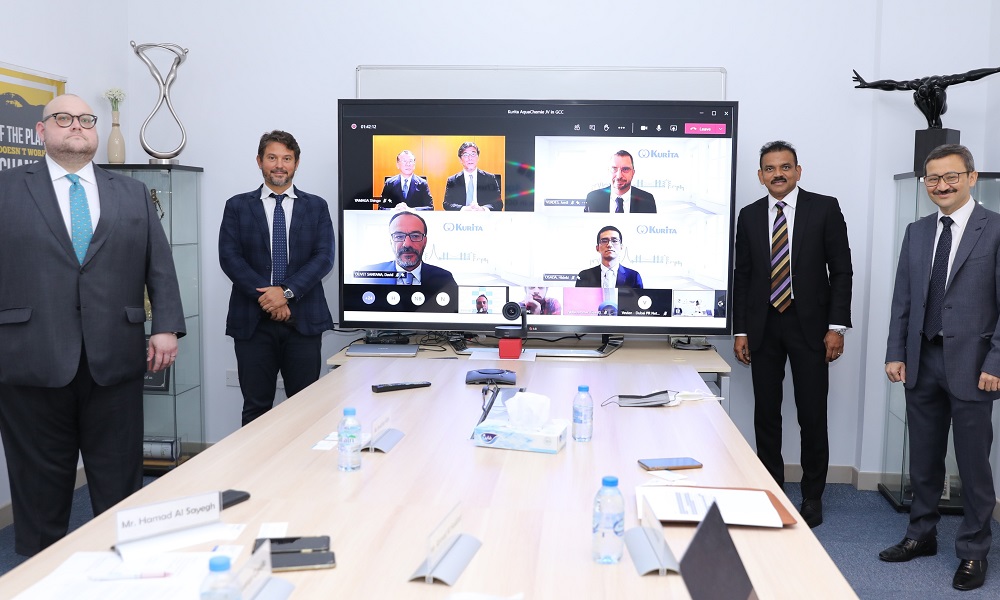Kurita and AquaChemie DMCC set up joint venture for GCC water and process treatment sector
Partnership includes production plants in the UAE and Saudi Arabia to serve sectors including petrochemicals, metals, power and desalination

Japanese multinational, Kurita Water Industries, and UAE-based AquaChemie DMCC have signed an agreement to set up a joint venture for water and process treatment chemicals solutions for the refinery, petrochemicals, fertiliser, power and desalination, paper and metal industries in the GCC.
The joint venture company, set up through Kurita’s subsidiary, Kurita Europe GmbH, will leverage both companies’ complementary strengths to be “the single face for customers in the wider GCC region and offer solutions based on technologically innovative Japanese programmes, fully backed by local production, resources, and prompt customer service”, said a statement from Kurita.
Kurita AquaChemie will operate two new production plants in Dammam, Saudi Arabia, and in Jebel Ali, Dubai. These two production sites were commissioned in H1 2020 and are expected to have a production capacity of about 230,000 metric tons per annum in the initial phase.
An agreement to officially form the new joint venture was signed in Dubai yesterday by Lorenzo Carollo, CEO of Kurita Middle East, and Subrato Saha and V Anandkumar, directors of AquaChemie DMCC, in the presence of top JAFZA officials.
Michiya Kadota, president of Kurita Group, Shingo Yamaga, senior general manager EMEA and Americas Operation of Kurita Group and Jordi Verdés, CEO of Kurita EMEA, and other senior members from Kurita and AquaChemie were present virtually at the signing.
Kurita AquaChemie already has a base of over 25 customers in the region, said the statement. The new entity, with Kurita as the major shareholder, has come at a time when the requirement is high, but options for customers are limited for patented bespoke Japanese technology. Kurita commits around 3% of its over $2bn turnover on R&D each year, with more than 3,000 patents to leverage. Kurita is the only global chemical company qualified as a member of the NAI (Nature Stock Index), which shows its commitment towards environmental sustainability.
Kurita AquaChemie says its focus on optimising water and energy resources can result in savings of up to 40%, with solutions delivered over the strong foundation created by AquaChemie through local infrastructure development in GCC countries, working relationships in the regional hydrocarbon industry, and professionals with years of experience in specialty chemicals’ sales and service.
Shingo Yamaga, senior general manager, EMEA and Americas Operation of Kurita Group, said: “To realise our dream of the Kurita company philosophy, ‘Study the properties of water, master them, and create an environment in which nature and man are in harmony’, establishing the business fundamentals in the Middle East countries has been essential and indispensable for us. With this new joint venture company, we are very much excited to make the critical step towards the dream, which allows us to provide our innovation and technologies directly to our customers in the GCC, where there is a need for such solutions.”
Lorenzo Carollo, CEO of Kurita Middle East, added: “I believe this operation fits perfectly into Kurita’s long-term strategy that in recent years is undergoing impressive acceleration. A strategy we define as ‘glocal’ – think globally, act locally. With this joint venture, a reality is born that will speedily bring the global innovations that Kurita develops, locally, to the GCC region.”
Subrato Saha, director of AquaChemie DMCC, noted: “AquaChemie has always strived to become a formidable player in the specialty chemicals space, with more than 25% year-on-year growth. Thus, when Kurita expressed interest in collaborating, we were immediately drawn by their globally trusted brand status, technology leadership, and deep-rooted pleasant Japanese culture.”
As most of the new company’s chemicals will be manufactured in the GCC region itself, this will inherently reduce input costs and provide better product availability, allowing customers to obtain better plant efficiency, reliability, and utilisation at competitive pricing.



















